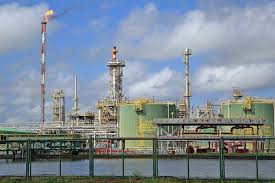
Oil Majors Set Their Sights on Suriname’s Untapped Potential
Suriname, a small country on the northeastern coast of South America, has become an increasingly attractive destination for major oil companies seeking new exploration
ortunities. Situated just offshore from the prolific oil-producing basin of Brazil and in
close proximity to Guyana’s giant oil reserves, Suriname is quickly gaining attention as the next frontier for offshore oil exploration. Major oil players like ExxonMobil, TotalEnergies, and Chevron have already begun to make their mark, drawn by the country’s significant
untapped oil reserves and favorable geological conditions. Suriname’s offshore fields are believed to hold large volumes of oil, with geophysical data indicating that there is considerable potential in both shallow and deepwater areas.
Suriname’s emergence as an oil exploration hotspot is due to a combination of favorable geological factors, proven reserves in neighboring Guyana, and increasing oil prices that have reinvigorated interest in energy investments. The country’s continental shelf is located in a geological formation similar to the
world-class Guyana-Suriname Basin, which has already yielded significant oil discoveries. Notably, in 2020, ExxonMobil made a landmark discovery with the drilling of the Maka Central-1 well, confirming the potential of the country’s offshore deposits. This has triggered a surge in
exploration activities by major oil companies, eager to secure drilling rights and exploration contracts in a region poised for growth.
The surge in oil exploration in Suriname has the potential to bring significant economic benefits to the country. As a small developing nation with a population of around 600,000 people, the discovery of large-scale oil reserves could lead to increased foreign investment, job creation, and improved infrastructure. The oil sector
could become a key pillar of Suriname’s economy, boosting government revenues through taxes and royalties from oil production. With the experience and technology of global oil majors, Suriname could accelerate its development, potentially transforming into a major oil exporter.
However, the rush to tap into Suriname’s oil reserves also comes with environmental challenges. Offshore oil drilling carries inherent risks, including the potential for oil spills, pollution, and damage to fragile marine ecosystems. The country’s biodiversity, which
includes pristine rainforests and diverse marine life, could be at risk from oil exploration activities. The government and oil companies will need to carefully balance the economic benefits of oil extraction with the need to protect Suriname’s unique environment.
Sustainable practices, stringent environmental regulations, and advanced technologies will play a critical role in mitigating environmental risks while capitalizing on the country’s oil potential.
As Suriname stands on the cusp of an oil boom, the question remains how it will navigate the complexities of resource management, environmental preservation, and economic development. The actions taken in the coming years will determine whether Suriname can maximize its oil wealth while safeguarding its
natural heritage. The growing presence of oil majors in Suriname signals the start of what could be a new chapter for the country’s economy, but it will also require careful oversight and long-term planning to ensure that the benefits outweigh the potential risks.
Leave a Reply